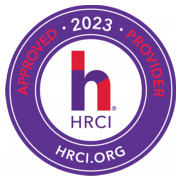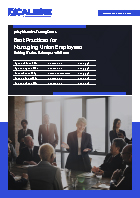| Date | Venue | Fee | |
|---|---|---|---|
| 27 Jul - 31 Jul 2026 | Astana - Kazakhstan | $ 5,950 | Register Now |
| 28 Sep - 02 Oct 2026 | Dubai – UAE | $ 5,950 | Register Now |
About the Course
Managing union employees presents unique challenges and opportunities, requiring a nuanced understanding of labor laws, collective bargaining agreements, and the dynamics of union-management relationships. This 5-day Best Practices for Managing Union Employees program will equip delegates with the knowledge and skills necessary to navigate these complexities effectively. Delegates will explore the fundamentals of union operations, legal frameworks, and the intricacies of collective bargaining, all while learning how to build and maintain positive relationships with unionized staff, emphasizing the importance of fostering a collaborative work environment rooted in mutual respect and trust.
Understanding labor unions' historical context and legal underpinnings is crucial for effective management. This training program begins by exploring the evolution of labor unions, highlighting key milestones and their impact on modern workplaces. Delegates will gain insights into labor relations' legal landscape, including essential laws like the National Labor Relations Act (NLRA) and the Fair Labor Standards Act (FLSA). By familiarising themselves with union structures, roles, and the collective bargaining process, they can better appreciate union members' and representatives' rights and obligations, paving the way for more informed and strategic interactions.
Building strong, positive relationships with union employees is a cornerstone of successful management. It provides practical strategies for enhancing communication, resolving conflicts, and promoting employee engagement. Delegates will learn to navigate the complexities of union contracts and negotiations, ensuring fair and equitable agreements while focusing on organisational goals. Additionally, it addresses the critical aspects of handling grievances and disciplinary actions, emphasizing fairness, transparency, and the importance of documentation. Delegates can create a supportive and productive workplace where union members and the organisation thrive by fostering a healthy work environment that prioritizes inclusivity, safety, and employee well-being.
Core Objectives
By the end of the training course, delegates will be able to:
- Understand the historical context and evolution of labor unions
- Familiarise with key labor laws and regulations
- Comprehend union structures and governance
- Master the components of Collective Bargaining Agreements (CBAs)
- Develop effective communication and trust-building skills
- Resolve conflicts and handle grievances professionally
- Know the union contract negotiations successfully
- Implement fair and consistent disciplinary procedures
- Promote a positive and inclusive work environment
- Monitor and evaluate workplace culture and performance
Training Approach
This training course employs a comprehensive training methodology combining interactive workshops, real-world case studies, and role-playing exercises. Delegates will engage in group discussions and hands-on activities to reinforce key concepts and practical skills. Additionally, expert-led presentations and Q&A sessions will provide deeper insights into complex topics, ensuring a well-rounded learning experience.
The Attendees
This training course is primarily attended by managers, supervisors, and HR professionals who oversee unionized employees.
Likewise, it will be valuable to the professionals but not limited to the following:
- Human Resources Managers
- Labor Relations Specialists
- Union Representatives
- Middle and Upper-Level Managers
- Supervisors of Unionized Employees
- Business Owners
- Employee Relations Advisors
- Legal Advisors specialising in Labor Law
- Corporate Trainers
- Operations Managers
Daily Discussion
DAY ONE: UNDERSTANDING UNION FUNDAMENTALS
- Overview and Purpose of Labor Unions
- Role of Unions in Modern Workplaces
- Legal Framework and Regulations
- National Labor Relations Act (NLRA)
- Fair Labor Standards Act (FLSA)
- Union-specific State Laws
- Union Structure and Governance
- Union Contracts and Collective Bargaining Agreements (CBAs)
- Union Membership and Dues
- Union Rights and Obligations
- Role of Union Stewards
- Grievance Procedures
- Labor Strikes and Lockouts
- Union Communication and Transparency
DAY TWO: BUILDING POSITIVE RELATIONSHIPS WITH UNION EMPLOYEES
- Creating a Collaborative Work Environment
- Effective Communication Techniques
- Trust-Building Strategies
- Conflict Resolution Skills: Mediation and Negotiation Techniques
- Employee Engagement and Participation
- Transparency and Information Sharing
- Respecting Union Roles and Functions
- Joint Problem-Solving Initiatives
- Recognition and Appreciation
DAY THREE: NAVIGATING UNION CONTRACTS AND NEGOTIATIONS
- Preparation for Negotiations
- Bargaining Tactics and Strategies
- Effective Negotiation Techniques
- Understanding Contract Language
- Legal Considerations in Negotiations
- Economic and Non-Economic Issues in Negotiations
- Handling Stalemates and Deadlocks
- Finalising and Ratifying Agreements
- Post-Negotiation Follow-Up
- Continuous Improvement and Relationship Maintenance
DAY FOUR: HANDLING GRIEVANCES AND DISCIPLINARY ACTIONS
- Understanding the Grievance Process
- Documentation and Record-Keeping
- Conducting Investigations
- Communication During Grievance Procedures
- Arbitration and Mediation
- Disciplinary Procedures and Fairness
- Progressive Discipline
- Avoiding Retaliation
- Resolving Disputes Amicably
- Learning from Grievances
DAY FIVE: PROMOTING A HEALTHY WORK ENVIRONMENT
- Fostering Inclusivity and Diversity
- Ensuring Workplace Safety
- Supporting Work-Life Balance
- Addressing Employee Well-being
- Effective Performance Management
- Employee Recognition Programs
- Team Building and Collaboration
- Open-Door Policies and Accessibility
- Monitoring and Evaluating Workplace Culture
Certificate Awarded
Upon successful completion of this training course, participants will be awarded a Certificate of Completion from XCalibre Training Centre, acknowledging their accomplishment. This certificate serves as a testament to their dedication to developing their skills and advancing their expertise in their respective fields.

Course Enquiry

A Human Resource Certification Institute (HRCI)® Pre-approved Training Course


